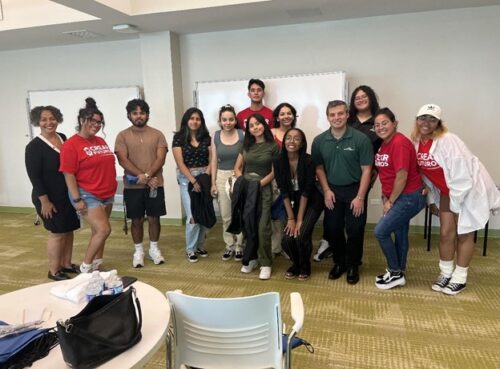Photo credit: SUNY.edu
Former SUNY’s Senior Vice Chancellor for Strategic Initiatives and Chief Diversity Officer, Teresa A. Miller, was recently appointed the new officer-in-charge at SUNY Old Westbury. She takes great pride in her latest opportunity and seeks to apply the tools from her seven years in senior leadership in her new role.
Dr. Miller spent her early life and the majority of her career on college campuses. She was raised primarily in Tidewater Virginia and Chapel Hill, North Carolina, in a blended family consisting of three sisters and two brothers. Her mother, who she considers to be her greatest role model, was pursuing her Ph.D. at UNC-Chapel Hill during Miller’s teenage years, which gave her the opportunity and inspiration to take college-level courses early on. Miller’s family placed a strong emphasis on her education, and she felt that as the third-generation of people with graduate degrees, she had a responsibility to become highly-educated.
Her family valued education and believed it to be the path to many opportunities, including personal growth and fulfillment. Although she stated that it would’ve been ideal to get her Ph.D., she is proud of what she accomplished and continues to be a lifelong learner, always exposing herself to new ideas.
While Miller spent many of her days on campus, she also had a multitude of passions that she engaged in during her free time. She has always been a very visual person, and pursued darkroom photography for many years, in addition to making several documentary films about the US prison system. When she moved to Miami for her first teaching job, she took advantage of the coastal landscape reminiscent of the Tidewater region of her childhood, and took windsurfing lessons in preparation for learning to sail. She eventually became an accomplished sailor of vessels between 21 and 42 feet long, and describes it as “equal parts terrifying and incredibly satisfying.”
Dr. Miller was raised with a strong set of values and a distinct awareness of where she came from. She said, “I was grounded in a set of values held by generations of my ancestors. In my family, the expectations of me were quite high. The emphasis was on what I owed to the family members who came before me. People who endured slavery in the hope that I could have a better life.” Dr. Miller instills those lessons into her own three children. “They know I expect them to aspire to a higher purpose in life than just being comfortable,” she explained.
Her mother graduated from Palmer Memorial Institute (PMI), a historically black boarding school founded in 1902 by Charlotte Hawkins Brown. At the time, black children in the South only received a basic education up to 6th grade, and were taught only reading, writing, and agricultural skills. PMI was one of the only schools in North Carolina to offer college preparatory programs, including Latin, upper level math, and philosophy. She was given the instruction that many black children were deprived of at the time, and showed Dr. Miller the importance of education.
Although Miller was unwavering in her desire for knowledge, things weren’t always so easy. She earned her undergraduate degree at Duke University, with a major in psychology and described college as a deep struggle for her and her black peers, who faced constant scrutiny due to their presence on a predominantly white campus. “It was not an easy time for me,” Miller recounted. “I was underprepared for the campus climate, under-advised about the curriculum, and isolated as a black student on a campus where black students constituted only 5% of the student population.” She related the experience to that of being like a “desert flower,” stating that “we were forced to blossom under real stress, but those of us who survived bloomed in the most brilliant colors.”
After receiving her undergraduate degree at Duke, Miller went on to train as an attorney at Harvard Law School before getting her LL.M. at the University of Wisconsin, Madison. Shortly after, she practiced law in Miami for three years, until she began to feel drawn to a different objective. Securities litigation didn’t fulfill her aspirations and desire to do something life-changing. Campus life and the challenge of inspiring students drew her to teaching. “Students are what I do this for. There’s no greater pleasure then when you see the light bulbs go off and see the student get it,” she explained. Being a professor was also a pathway to her continued learning, which is an ongoing goal for her.
Dr. Miller has an abundance of achievements under her belt. While she primarily teaches law, she has also been heavily involved with education in prison systems, and reforming the immigration system. She and a small number of law professors founded an area of law called crimmigation, which is one of her greatest achievements in her academic career. She spent years taking her students to detention centers and maximum security prisons, and feels that she opened the eyes of many to what was going on behind closed doors.
One of the most important aspects of being an educator is to give students opportunities to learn, and that was at the forefront of her teaching style. “I left school wanting to change the world,” she stated, “but I wasn’t specific about how. And I think I found, in teaching law, the ability to empower individuals.” Dr. Miller’s focus is on immigration and prison law, in addition to criminal procedures and contracts. She was a member of the law school faculty at the University of Buffalo for 25 years when she became their inaugural chief diversity officer, placing a substantial emphasis on equity and inclusivity. Now she serves as the officer-in-charge at SUNY Old Westbury, and considers it a great honor to serve as the bridge between Dr. Calvin O. Butts III and the new president.
She is highly student-centered, and always faces problems head on. The lessons that she has learned while serving as the SUNY Sr. Vice Chancellor for Strategic Initiatives and Chief Diversity Officer have not only given her the tools to be a great leader, but have also shown her the value of collaboration and team work with a diverse group of people. “I know that diverse teams solve complex problems better and faster. I am very much a collaborator and feel that excellence results from the strategic input of leaders with diverse experiences. I don’t think I would have led that way if I hadn’t served as a chief diversity officer,” she explained.
As for our current situation, Dr. Miller acknowledges that these are unprecedented times for both students and staff. She encourages us “not to let this pandemic rob us of what makes Old Westbury a cohesive campus community. We’ve never experienced anything like this, but we will be back together as a community soon.” To the student community, Dr. Miller expresses the hope that we “don’t let this COVID-19 crisis derail your hopes, dreams and plans for the future. Old Westbury’s faculty and staff will do everything we can to make it possible for you to continue to learn, progress towards your degree, and excel in your chosen field of study.”







